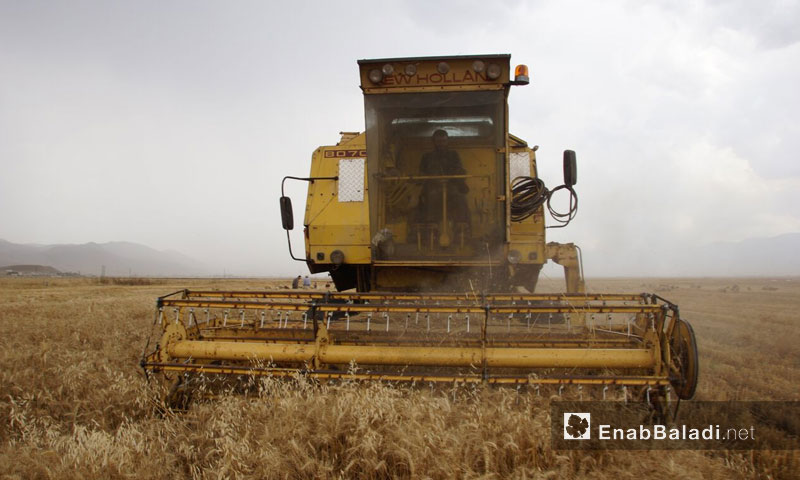
Al-Ghab Plain Exports its Wheat to Syrian Regime Control Areas

The wheat farmers in al-Ghab Plain, western rural Hama, are suffering from the difficulty of selling their production, as they lack entities specialized in wheat production disposal, a suffering backed by exploitation, for the merchants are buying the wheat for insignificant prices.
Despite the staggering amount of wheat produced, due to bad weather, medicines and fertilizers’ shortage, the farmers are compelled to export their production to the areas controlled by the Syrian regime.
Motaaz Mawas, the head of the Agricultural Extension in the village of Tall, in central al-Ghab Plain, told Enab Baladi that the Plain is a food reservoir at the level of the two governorates of Hama and Idlib. This year’s wheat has been cultivated in wide areas, more than 200 thousand dunam in rural Hama”, he said.
Mawas added that no entity, involved organizations or the Syrian Interim government, showed the interest to buy the wheat production in the liberated areas, which compelled the farmers to sell it to the Syrian regime depending on brokers representing the two sides.
For his part, Alaa Shaizeri, an engineer in Hama Grains Center, stated that the Center’s administration is currently studying the project of buying the wheat produced by al-Ghab Plain’s farmers, pointing out that the project is directly related to the Center’s fiscal resources.
Shaizeri referred to the idea that the Hama Center did not purchase wheat in the past years because it has a contract with the delegates of “Wheat Project 2018”, launched by the General Organization for Seed Multiplication in the town of Hbit, in southern rural Idlib, which used to buy the farmer’s production of wheat instead.
He pointed out that exporting western rural Hama’s wheat to the areas under the control of the Syrian regime is not a new thing, as it has been transported through the crossings of Qalaat al-Madiq and Abu Dali for the past three years.
The Production’s Destination
The farmers in the al-Ghab Plain have repeatedly appealed to the establishments of the Syrian Interim Government and the Assistance Coordination Unit as buy their production but to no avail.
He added that the donors and revolutionary foundations abandonment of farmers has gave the regime the power to exploit the situation and buy significant amounts for little prices in the absence of competitors and the need to market the crops.
This season’s amount of cultivated wheat in al-Ghab plain has estimated reached 275 thousand tons, planted in an area of about 100 thousand dunam according to Shaizeri.
He said that entities in the opposition-held areas do not have the needed sources to buy large amounts of wheat, such as the General Grains Organizations, with its branches in Idlib and Aleppo, and the centers of the Assistance Coordination Unit (ACU), with its facilities in Khan Shaykhun, Maarrat al-Nu’man and Aleppo.
These entities can afford to purchase amounts estimated with 60 thousand tons, including the reserve storage, which keeps 200 thousand tons out of the market as Shaizeri told Enab Baladi.
He pointed out that last year Hama Grains Center did buy 250 tons from the farmers, while Idlib’s center purchased 4500 tons of wheat, which shows the weakness of the crop’s marketing.
Prices and the Exploitation of Farmers’ Needs
Mawas estimated the amounts of money that the regime is paying for the bought wheat with 162 to 118 thousand Syrian pounds per ton; while it pays about 170 Syrian pounds in exchange for the wheat produced in its regions, which affirms the Syrian regime’s exploitation of the farmers’ urgent need in rural Hama.
The tendency to exploit the farmers is not limited to the low prices, since the farmers are supposed to pay additional sums of money, such as shipping and transportation expenses, as well as extravagant taxes imposed by the regime’s checkpoints on the exported wheat.
Hama’s mayor called on its “delegates” to buy the wheat from the opposition-held areas for low costs and impose a blackmail-based policy on the farmers, which thrusted them a hell, where they are faced with either insignificant prices or the loss of the crops according to Mawas.
Mawas estimated this year’s wheat production prices with $290 per ton of hard wheat and $285 per ton of soft wheat.
Farmer Ibrahim al-Mohammad told Enab Baladi about his experience and said that he resorted to selling his crop to the regime loyalist merchants due to lacking disposal channels. The crops are delivered to Qalaat al-Madiq, from where it is shipped to al-Suqaylabiyah, rural Hama, which the regime controls.
The price of a per kilo of wheat varies between 115 and 118 Syrian pounds, which farmer Ibrahim considers insignificant.
The regime’s wheat foundation refused to receive large amounts of the opposition-held areas’ wheat on the pretext that it has strange types that differ from the ones accredited by the Regime’s establishments.
The Syrian wheat production for 2018 is estimated with about 1.8 million tons, the majority of which is cultivated in the eastern parts of Syria.
if you think the article contain wrong information or you have additional details Send Correction
النسخة العربية من المقال
-
Follow us :
Most viewed
- Al-Hijri escalates against Damascus: A "radical" government
- Turkey confirms continuation of its operations in northeastern Syria
- Governor of As-Suwayda signs understanding agreement with al-Hijri: Key details unveiled
- Al-Sharaa signs draft constitutional declaration
- Details of Damascus-As-Suwayda agreement

















 A
A
A
A
A
A



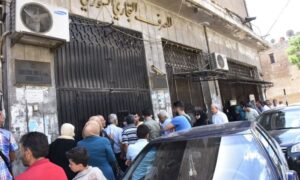
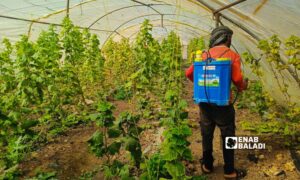
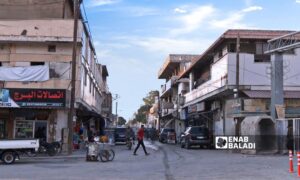
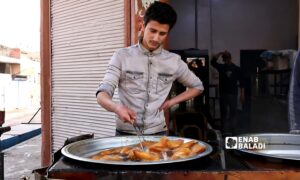
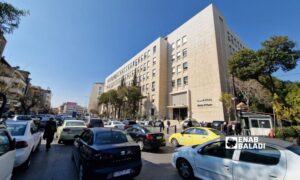
 More Economy
More Economy